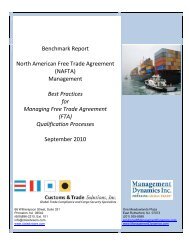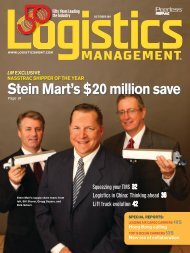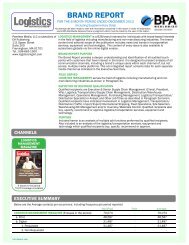Logistics Management - June 2010
Logistics Management - June 2010
Logistics Management - June 2010
You also want an ePaper? Increase the reach of your titles
YUMPU automatically turns print PDFs into web optimized ePapers that Google loves.
State of materials handling, continued<br />
dents. In <strong>2010</strong>, “safety” and “cost containment”<br />
remain the top two concerns<br />
while “company growth” has dropped<br />
down to number five, replaced by<br />
“throughput.” As the economy recovers,<br />
the survey reveals that companies are<br />
typically more concerned about increasing<br />
throughput capacity with resources<br />
that they already have—much of which<br />
may have been scaled-down by the economic<br />
downturn.<br />
Security or privacy issues, particularly<br />
the release of customer information<br />
and financial information, have<br />
also become more sensitive issues for<br />
51 percent of respondents. Pribula<br />
notes that four years ago, security concerns<br />
would have revolved around company-owned<br />
assets. “Now we’re talking<br />
about securing data because it’s more<br />
electronic, with more connectedness<br />
between systems and more information<br />
being shared among manufacturers,<br />
distributors, retailers and customers.”<br />
A look at green efforts<br />
Predictably, recycling continues to<br />
dominate as the most popular environmentally<br />
sustainable initiative currently<br />
in use (76 percent). But other up-andcoming<br />
“green” ideas have certainly<br />
piqued the interests of many respondents.<br />
Most notably, there seems to be<br />
major buzz around the installation<br />
of “solar panels” on top of distribution<br />
facilities. Despite a current use<br />
rate of only 9 percent, over half of the<br />
respondents (53 percent) are planning<br />
to evaluate the use of solar panels for<br />
their DCs over the next 12 months.<br />
Derewecki believes that this is probably<br />
driven by new incentives, good<br />
corporate citizenship, and regulations<br />
and evolving federal policies. “Warehouses<br />
are certainly a natural application<br />
for solar panels, because they have<br />
so much roof space.”<br />
Our panel is also surprised by the<br />
significant interest (over 40%) in<br />
the use of metal and plastic pallets.<br />
Derewecki notes that there have been<br />
recent problems with contamination<br />
that one of the pharmaceutical<br />
manufacturers attributed to wooden<br />
pallets. “That has since been denied<br />
by the wood pallet association,” he<br />
adds. “But this incident may have<br />
Materials handling equipment and systems:<br />
Solutions and systems in use and likely to<br />
evaluate in the next 18 months<br />
Rack and shelving<br />
Printers<br />
Lift trucks and accessories<br />
Totes, bins and containers<br />
Bar code scanners<br />
Dock equipment<br />
Packaging including palletizers,<br />
pallets and dunnage<br />
Wireless terminals<br />
Conveyors including<br />
sortation equipment<br />
Controls<br />
Power transmission including<br />
motors and belts<br />
Hoists, cranes, and monorails<br />
RFID solutions/products<br />
Automated storage including<br />
carousels and vertical lift modules<br />
In use<br />
AGVs<br />
Other<br />
16%<br />
19%<br />
Source: Modern Materials Handling/<strong>Logistics</strong> <strong>Management</strong> survey<br />
re-ignited interests, since one of the<br />
biggest advantages with plastic and<br />
metal pallets is that they could be put<br />
through sterilization processes.”<br />
As big retailers like Wal-Mart<br />
and Target push their suppliers into<br />
adopting more green initiatives, our<br />
panel predicts interest in these environmentally<br />
sustainable ideas will<br />
increase significantly as the economy<br />
recovers.<br />
Who’s buying what<br />
Curious as to what titles are involved<br />
in the various decisions inside the four<br />
26%<br />
27%<br />
25%<br />
23%<br />
21%<br />
21%<br />
27%<br />
26%<br />
33%<br />
30%<br />
42%<br />
39%<br />
38%<br />
49%<br />
62%<br />
60%<br />
72%<br />
70%<br />
70%<br />
86%<br />
86%<br />
85%<br />
RFID is the top<br />
23%<br />
43% technology to evaluate<br />
in 18 months.<br />
19%<br />
35%<br />
10%<br />
27%<br />
1%<br />
2%<br />
Plan to evaluate/invest in 18 months<br />
walls While material handling and DC<br />
managers are most involved in determining<br />
the need for material handling<br />
systems, evaluating solutions, and<br />
establishing specifications for bids, purchasing<br />
and corporate management are<br />
typically principally involved in evaluating<br />
vendors and approving or authorizing<br />
purchases.<br />
Material handling, DC, and plant<br />
management are predominantly<br />
involved in buying materials handling<br />
equipment such as storage solutions,<br />
lift trucks, dock equipment, packaging<br />
and pallets, conveyors and carou-<br />
28 <strong>Logistics</strong> <strong>Management</strong> WWW.LOGISTICSMGMT.COM | <strong>June</strong> <strong>2010</strong>

















